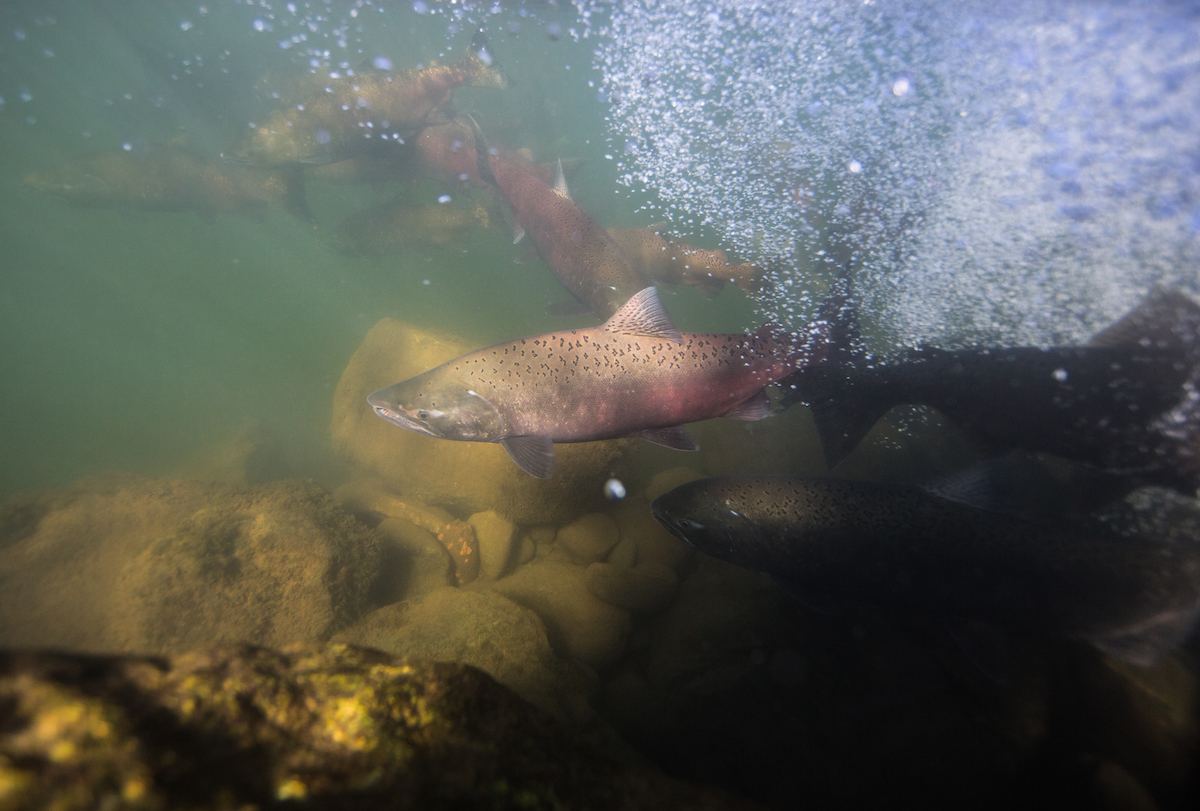Adult fall-run Chinook salmon congregate. DWR/2012
SACRAMENTO, Calif. – The Department of Water Resources (DWR) today awarded $11 million in grants to five projects that will improve the habitat and chances of survival for native fish species within the lower San Joaquin River watershed.
These grant awards are part of DWR’s San Joaquin Fish Population Enhancement Program (SJFPEP) and are funded by Proposition 13, the Safe Drinking Water, Clean Water, Watershed Protection, and Flood Protection Act of 2000. The program provides financial and technical assistance for projects that improve habitat conditions for salmon, steelhead, and other native fish species in the lower San Joaquin River watershed.
“DWR is committed to supporting these pivotal restoration projects that will ensure the long-term health of the San Joaquin River and its native fish and wildlife species,” said DWR Director Karla Nemeth. “Projects like these will mitigate impacts to the natural environment and protect migratory salmon populations in the Central Valley and Bay-Delta using the best available science and innovative solutions.”
The grant awards include:
- A $2.1 million grant for the Tuolumne River Conservancy for the Bobcat Flat Phase III Construction project, which will restore spawning and rearing habitat nine miles downstream of La Grange Dam. The project will reconnect 50 acres of floodplain to the river, restore 2,900 feet of riffles and side-channel habitats, fill instream gravel pits to reduce non-native fish habitat, and augment coarse sediment to expand spawning and riffle habitats.
- The Merced Irrigation District was awarded $2.4 million for the Merced River Salmonid Habitat Restoration Project, which will restore natural processes and improve spawning and rearing habitat upstream of Henderson Park. The project includes dredger tailing removal, opening the river corridor for flood releases, and creating 10 acres of seasonally-flooded off-channel riparian habitat.
- The Tuolumne River Preservation Trust and the Tuolumne River Conservancy received $3.7 million for the Basso/La Grange Reach Floodplain Restoration Project. This project will restore spawning and rearing habitat by removing infrastructure debris from the channel, creating 129 acres of floodplain, and by restoring spawning beds two miles downstream of La Grange Dam.
- More than $500,000 in funding was awarded to the Turlock Irrigation District for the Harding and Nielsen Drain Fish Barrier Project, which will install fish exclusionary structures at two drain outfalls. The barriers will improve upstream migration by preventing straying into the drainage systems. They are estimated to last 50 years and will save an estimated 1,000 adult salmon during that period.
- Tuolumne River Preservation Trust and the City of Modesto was awarded $2.1 million for the Tuolumne River Regional Park Carpenter Road Floodplain Restoration Project, which will restore 9.5 acres of floodplain rearing habitat. In 2018, DWR’s Urban Streams Restoration Program partnered with the award recipient to remove Dennett Dam to improve salmon migration and reduce public safety hazards for boaters and swimmers.
Awarded projects include those that align with Ecosystem Restoration Stage 1 Actions identified in the CALFED Bay-Delta Program Implementation Plan; the NOAA Fisheries Recovery Plan for winter-run Chinook Salmon, spring-run Chinook Salmon, and Central Valley Steelhead; and Voluntary Agreements that may be identified as part of the State Water Resources Control Board’s Bay-Delta Water Quality Control Plan.
The San Joaquin Fish Population Enhancement Program is one of three sub-programs managed by DWR’s Riverine Stewardship Program. Other sub-programs include the Fish Passage Improvement Program and the Urban Streams Restoration Program.
These awards conclude the grant solicitation for the San Joaquin Fish Population Enhancement Program until additional funding becomes available.
###
Contact:
Akiela Moses, Information Officer, Public Affairs, Department of Water Resources
(916) 653-9638 | Akiela.Moses@water.ca.gov
